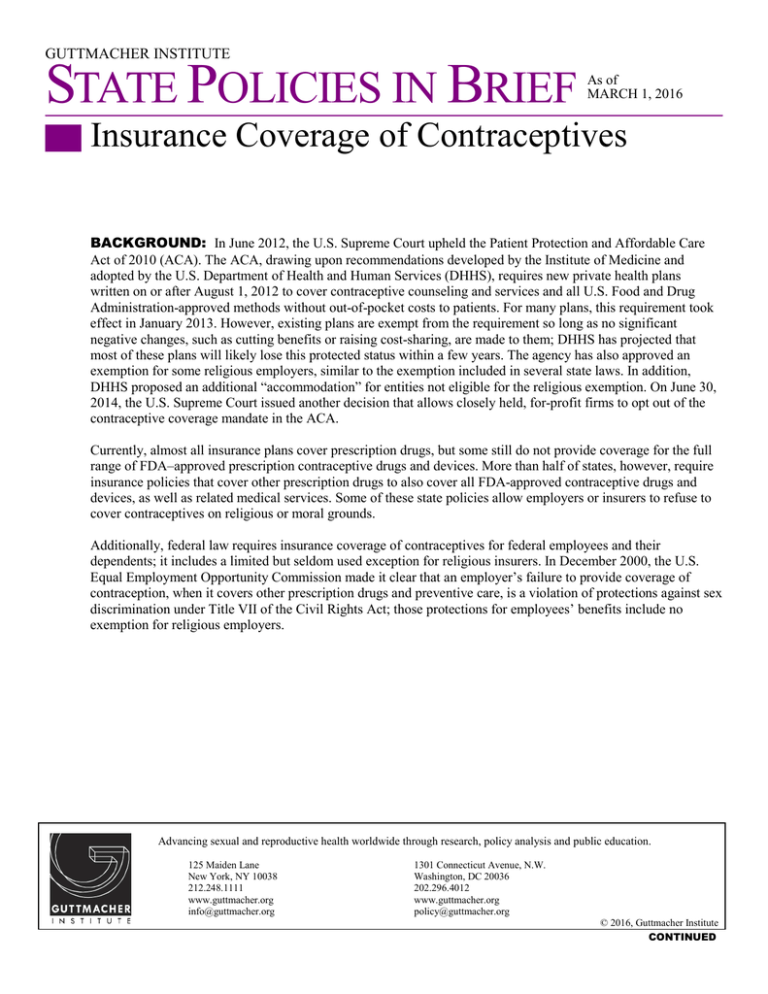S P B
advertisement

GUTTMACHER INSTITUTE STATE POLICIES IN BRIEF As of MARCH 1, 2016 Insurance Coverage of Contraceptives BACKGROUND: In June 2012, the U.S. Supreme Court upheld the Patient Protection and Affordable Care Act of 2010 (ACA). The ACA, drawing upon recommendations developed by the Institute of Medicine and adopted by the U.S. Department of Health and Human Services (DHHS), requires new private health plans written on or after August 1, 2012 to cover contraceptive counseling and services and all U.S. Food and Drug Administration-approved methods without out-of-pocket costs to patients. For many plans, this requirement took effect in January 2013. However, existing plans are exempt from the requirement so long as no significant negative changes, such as cutting benefits or raising cost-sharing, are made to them; DHHS has projected that most of these plans will likely lose this protected status within a few years. The agency has also approved an exemption for some religious employers, similar to the exemption included in several state laws. In addition, DHHS proposed an additional “accommodation” for entities not eligible for the religious exemption. On June 30, 2014, the U.S. Supreme Court issued another decision that allows closely held, for-profit firms to opt out of the contraceptive coverage mandate in the ACA. Currently, almost all insurance plans cover prescription drugs, but some still do not provide coverage for the full range of FDA–approved prescription contraceptive drugs and devices. More than half of states, however, require insurance policies that cover other prescription drugs to also cover all FDA-approved contraceptive drugs and devices, as well as related medical services. Some of these state policies allow employers or insurers to refuse to cover contraceptives on religious or moral grounds. Additionally, federal law requires insurance coverage of contraceptives for federal employees and their dependents; it includes a limited but seldom used exception for religious insurers. In December 2000, the U.S. Equal Employment Opportunity Commission made it clear that an employer’s failure to provide coverage of contraception, when it covers other prescription drugs and preventive care, is a violation of protections against sex discrimination under Title VII of the Civil Rights Act; those protections for employees’ benefits include no exemption for religious employers. Advancing sexual and reproductive health worldwide through research, policy analysis and public education. 125 Maiden Lane New York, NY 10038 212.248.1111 www.guttmacher.org info@guttmacher.org 1301 Connecticut Avenue, N.W. Washington, DC 20036 202.296.4012 www.guttmacher.org policy@guttmacher.org © 2016, Guttmacher Institute CONTINUED HIGHLIGHTS: 28 states require insurers that cover prescription drugs to provide coverage of the full range of FDAapproved contraceptive drugs and devices; 17 of these states also require coverage of related outpatient services. 2 states exclude emergency contraception from the required coverage. 1 state excludes minor dependents from coverage. 20 states allow certain employers and insurers to refuse to comply with the mandate. 8 states do not permit refusal by any employers or insurers. 3 states include a “limited” refusal clause that allows only churches and church associations to refuse to provide coverage, and does not permit hospitals or other entities to do so. 7 states include a “broader” refusal clause that allows churches, associations of churches, religiously affiliated elementary and secondary schools, and, potentially, some religious charities and universities to refuse, but not hospitals. 9 states include an “expansive” refusal clause that allows religious organizations, including at least some hospitals, to refuse to provide coverage; 1 of these states also exempts secular organizations with moral or religious objections. (An additional state, Nevada, does not exempt any employers but allows religious insurers to refuse to provide coverage; one other state exempts insurers in addition to employers.) 14 of the 20 states with exemptions require employees to be notified when their health plan does not cover contraceptives. 4 states attempt to provide access for employees when their employer refuses to offer contraceptive coverage, generally by allowing employees to purchase the coverage on their own, but at the group rate. CONTINUED GUTTMACHER INSTITUTE MARCH 1, 2016 INSURANCE COVERAGE OF CONTRACEPTIVES STATE Arizona Arkansas California Colorado Connecticut Delaware Georgia Hawaii Illinois Iowa Maine Maryland Massachusetts MichiganΩ Missouri MontanaΩ Nevada New Hampshire New Jersey New Mexico New York North Carolina Oregon Rhode Island Texas Vermont Virginia Washington West Virginia Wisconsin TOTAL COVERAGE REQUIRED Prescription Outpatient Drugs & Devices Services X X X X X X X X X X X X X X X X X X X X X X X X X X X X X X X X X X X X X Ψ Ψ X X Ψ Ψ X X X X X X 28 17 EXCLUSIONS EC Minor Dependents “Limited” X Scope “Broader” REFUSAL PROVISIONS Enrollees Notified by: “Expansive” X Employer Access for Enrollees X X Employer X* X Insurer Employer * X X†,‡ Employer X X X Employer Employer X Insurer † Insurer X X X X Employer X X X X Employer/Insurer Insurer X Employer X X X 2 1 3 7 X Insurer X 9 14 4 * Religious insurers are not exempt from the mandate but may provide contraceptive coverage through a subcontract with another insurer or third-party entity. † Refusal clause applies to insurers. ‡ Refusal clause applies to secular entities that object on moral or religious grounds. Ω Policy is the result of an administrative ruling (Michigan) or an attorney general opinion (Montana). Ψ Employers must be offered the option to include coverage of contraceptives within the health plan. CONTINUED GUTTMACHER INSTITUTE MARCH 1, 2016 FOR MORE INFORMATION: For information on state legislative and policy activity, click on Guttmacher’s Monthly State Update, for state-level policy information, see Guttmacher’s State Policies in Brief series, and for information and data on reproductive health issues, go to Guttmacher’s State Center. To see statespecific reproductive health information, go to Guttmacher’s Data Center, and for abortion-specific information, click on State Facts About Abortion. To keep up with new state relevant data and analysis, sign up for the State News Quarterly Listserv. Sonfield A, Rounding Out the Contraceptive Coverage Guarantee: Why ‘Male’ Contraceptive Methods Matter for Everyone, Guttmacher Policy Review, 2015, 18(2)34-39. Hasstedt K, Building It Is Not Enough: Family Planning Providers Poised for Key Role in Helping People Obtain Coverage Under the Affordable Care Act, Guttmacher Policy Review, 2014, 17(4):7-13. Dreweke J, U.S. Abortion Rate Continues to Decline While Debate over Means to the End Escalates, Guttmacher Policy Review, 2014, 17(2):2-7. Sonfield A, Pay-for-Performance: Making It Work for Safety-Net Family Planning Centers and the Clients They Serve, Guttmacher Policy Review, 2014, 17(2):8-13. Atkins DN and Bradford DW, Changes in State Prescription Mandates For Insurers: The Effect on Women’s Contraceptive Use, Perspectives on Sexual and Reproductive Health, 2014, 46(1). Sonfield A, Contraceptive Coverage at the U.S. Supreme Court: Countering the Rhetoric with Evidence, Guttmacher Policy Review, 2014, 17(1):2-8. Sonfield A, Implementing the Federal Contraceptive Coverage Guarantee: Progress and Prospects, Guttmacher Policy Review, 2013, 16(4):8-12. Sonfield A, Federal contraceptive coverage requirement emerges as major political issue, despite accommodation for religiously affiliated employers, Guttmacher Policy Review, 2012, 15(1): 20–21. Sonfield A, The religious exemption to mandated insurance coverage of contraception, Virtual Mentor, 2012, 14(2):137-145. Sonfield A, New federal protections expand coverage without cost-sharing of contraceptives and other women’s preventive services, Guttmacher Policy Review, 2011, 14(3):24. Guttmacher Institute, Testimony of the Guttmacher Institute Submitted to the Committee on Preventive Services for Women Institute of Medicine, January 12, 2011. Sonfield A, The case for insurance coverage of contraceptive services and supplies without cost-sharing, Guttmacher Policy Review, 2011, 14(1):7–15. Sonfield A, Contraception: an integral component of preventive care for women, Guttmacher Policy Review, 2010, 13(2):2–7. Gold RB, Family planning and health care reform: the benefits and challenges of prioritizing prevention, Guttmacher Policy Review, 2009, 12(1):19–24. Sonfield A, The movement against health insurance benefit mandates: assessing the dangers, Guttmacher Policy Review, 2006, 9(2):7–10 & 18. Sonfield A and Gold RB, New study documents major strides in drive for contraceptive coverage, Guttmacher Report on Public Policy, 2004, 7(2):4–7. Dailard C, Contraceptive coverage: a 10-year retrospective, Guttmacher Report on Public Policy, 2004, 7(2):6–9. Sonfield A, Affordable Care Act survives Supreme Court test, but Medicaid expansion placed in peril, Guttmacher Policy Review, 2012, 15(3): 2–7. GUTTMACHER INSTITUTE MARCH 1, 2016




